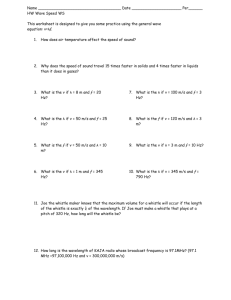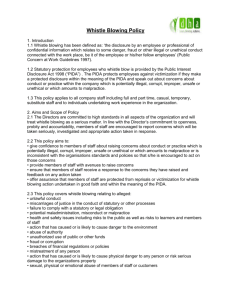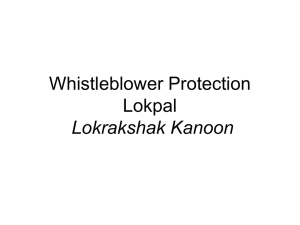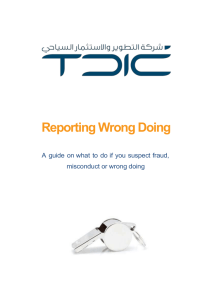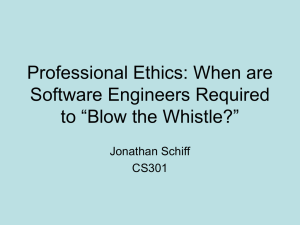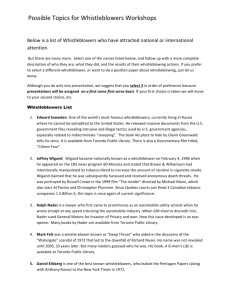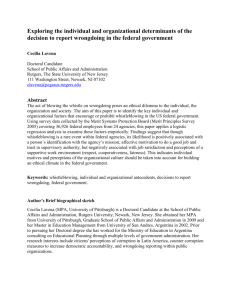Whistle Blower Policies
advertisement
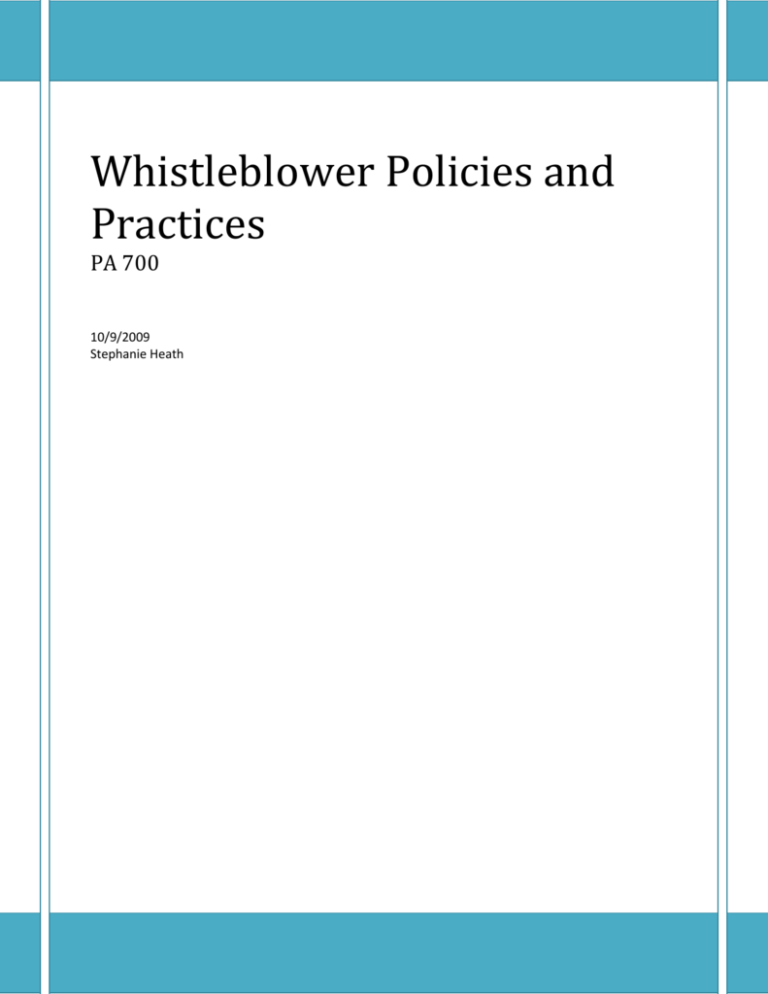
Whistleblower Policies and Practices PA 700 10/9/2009 Stephanie Heath 2 To: Eric Zeemering From: Stephanie Heath Re: Whistleblower Policies Date: 10/9/09 Introduction: A large portion of the unethical and immoral behavior taking place in the United States workforce, which is eventually brought to the surface, is done so by the people on the inside. These individuals are called Whistleblowers. They can be driven by a complex combination of motives, and there really is no exact profile to follow. The most popular image of the whistleblower is a concerned citizen or employee that brings information to the attention of the organization, with no pre-conceived notions of a grand award. They hope the organization will address the problem, and believe the only reason they have yet to do so is that the organization was simply unaware. These people that chose to blow the whistle are given the freedom to do so in this country. For the purpose of this assignment I will be giving a brief definition and historical overview, followed by some objectives, a few examples, implications and finally a look to the future. Definition: Whistleblower Policies are defined as the disclosure by organization members (former or current) of illegal, immoral, or illegitimate practices under the control of their employers, to persons or organizations that may be able to effect action. An individual observing wrongdoing within an organization faces two ethical decisions: whether to blow the whistle, and to whom to blow the whistle (Dworkin and Baucus 1998). There is also the idea of internal versus external whistle blowing. The above definition covers both examples of internal and external whistle blowing. Those people that have used both channels, as most have, find very little systematic differences. Secondly this definition implies that the concern being raised involves some sort of 3 wrong doing by a person or people under the organization. This “wrong doing” term is difficult to define. To understand this definition, one must thirdly realize that the purpose of the whistleblowing is to get the wrongdoing stopped, therefore the complaint must be made to someone believed to have power to terminate wrongdoing (Miceli, Near 2008). By this definition, one can deduce that both the self-interested and altruistic receive some sort of benefit by blowing the whistle. It could relieve the conscious of the whistleblower, as well as make for a much less stressful work environment. They could also hope for some harmful conclusion for others, like they may hope that the wrongdoers will pay a price. Objectives: Whistle blowing has long been regarded by large organizations as important for insuring accountability in otherwise nonresponsive bureaucracies (Jos Hays Tompkins 1989). The drive to blow the whistle can be appealing to employees who cannot live with the wrongdoings of the higher-ups in their organization; therefore they have a fundamental right to be protected. Whistleblower policies are in place to protect those who chose to blow the whistle on these wrongdoers. Under the Sarbanes-Oxley Act of 2002, whistleblowers are protected by law enforcement or government agency. They will not lose their jobs, receive pay cuts, have a negative working environment, their job duties will not change etc. They are to continue to be treated with respect from the organization. Also, an employer may not make any rules that will inhibit an employee’s right to blow the whistle. They may not retaliate against the whistleblower and they may not retaliate against an employee for their refusal to engage in an activity deemed illegal by the government. Historical Overview: Historically speaking, whistle blowing has been a cause for concern for centuries, since the 4 earliest forms of government. Creating more laws and regulations on how to deal with the whistleblowers themselves, not to mention those that got the whistle blown on them is a long and enduring process. According to Miceli and Near (2008) Congress passed the Civil Service Reform Act (CSRA) in 1978 to protect federal employees who report waste, fraud or abuse in federal agencies. The CSRA authorized the Office of the Special Council (OSC) to investigate claims concerning prohibited personnel practices. In 1989, Congress passed the Whistleblower Protection Act (WPA) giving whistleblowers the right to appeal to the Merit Systems Protection Board (MSPB), which is a federal organization that protects federal merit systems and the employees who work within them. Examples There have been quite a few major whistleblowing cases in the past and a few of the most recent ones that I will quickly give some background information on and the final outcomes of are the CEO’s of Enron and Bernie Madoff’s Ponzi scheme. Enron as one of the biggest scandals in latest U.S. History was not an exact case of whistleblowing, but so close I feel it’s worth mentioning. Sherron Watkins wrote a memo to Enron CEO Stephen Lay stating that she felt the company was going to be harshly audited for it’s wrongdoings. She felt the company was going to implode from the inside and she will have nothing to show for her last eight years of service there. She was hailed as “Enron Whistleblower” but if she had been truly a whistleblower she would have written that memo to the local paper or a national one at that. The goal of blowing the whistle is to know who to blow it to. In the case of Madoff, the whistle was blown here countless times by Harry Markopolus and his associates. He stated in his testimony before a judge that “the Securites and Exchange Commission was financially illiterate and harmful to our nation’s reputation as a financial leader.” (Chew 2009) It seems as if Harry Markopolus 5 attempted to blow the whistle several times on the Madoff Ponzi scheme, but to no avail. I believe that both of these examples have positive and negative qualities. Watkin’s failure to blow the whistle to someone who would have wanted to hear it was the downfall in that case. Also, in the case of Markopolus’s attempts to blow the whistle, he went to the right people, people who should have wanted to hear it, but their inability to do so caused a major breakdown in the effectiveness of whistleblower policies and practices. Eventually the people at fault were removed from their positions and most are spending a lifetime in jail, but unfortunately it was not in time to save many Americans from losing their life savings. The positive way to look at this is knowing that these laws and policies do exist as a freedom to the people of the United States. That is what makes the whistleblowing policies a great test of our governmental systems. Implications Whistleblowers and the policies created to protect them have everything to do with public administration for it is the public administrator who likely sees a need to protect the whistleblower in a new way, from a new form of retaliation or from a new and different agency. It is also the public administrator who will most likely carry out new forms of policy created by government in the protection of the whistleblower. In the words of Denhardt, Gortner and Rohr, Public Administrators have a unique ethical responsibility to serve the public interest through performing their jobs in a manner that is consistent with the values and standards of the people (Baldwin Rothwell 2006). Beyond the efficiency and effectiveness values of the bureaucratic ethos, public administrators are expected to uphold a democratic ethos that includes the values of liberty, equality, property, fairness, citizenship and constitutional rights (Baldwin Rothwell 2006). The public administrator often operates in a world of conflicting and difficult values, but it is ultimately the situation of the civil servant to continue to carry out the needs and desires of 6 the public to the best of their ability. Looking to the Future: In the aftermath of September 11, 2001, silent workers who fail to report wrongdoing contribute to unprecedented feelings of vulnerability and insecurity that plague the American public (Baldwin Rothwell 2006). To know that people like Bernie Madoff could have been stopped earlier and that all the people affected by his greediness could have been prevented is terrifying and tragic. This notion eats away at the general public’s feeling of safety and well being. It also can take away some trust that is put into policies and the government. This notion is the forefront of policy making for how to continue to protect the whistleblowers. This is something that will not go away, it will continue to occur as long as there are unethical immoral people. Conclusion: I am amazed at the heroic efforts of the general public to bring to justice the dishonorable actions of their co-workers, supervisors and leaders. These people risk so much for the greater good, being able to continue to live with themselves. Most of the whistleblower statements that I read said that they just couldn’t take it anymore, that they had no choice. But some have said that if given the choice again, they are not so sure the same choice would be made. The American public is given the choice of freedom; freedom to blow the whistle to stand up to huge organizations that more or less runs this country. 7 References Baucus, M. & Dworkin, T. (1998). Internal vs. External Whistleblowers: A Comparison of Whistleblowering Processes. Journal of Business Ethics, 17(12), 1281-1289. Chew, R. (2009, February 4). A Madoff Whistle-Blower Tells His Story. Time Magazine. Retrieved from http://www.time.com/time/business/article/0,8599,1877181,00.html Hays, S. & Jos, P. & Tompkins, M. (1989). In Praise of Difficult People: A Portrait of the Committed Whistleblower. Public Administration Review, 49(6), 552-561. Miceli, M & Near, J. (2008). Wrongdoing, Whistleblowing, and Retaliation in the U.S. Government: What Have Researchers Learned from the Merit Systems Protection Board Survey Results?. Review or Public Personnel Administration. 28(3), 263-281. doi: 10.1177/0734371X08319153. Rothwell, G. & Baldwin, J. (2006). Ethical Climates and Contextual Predictors of WhistleBlowing. Review of Public Personnel Administration, 26(3), 216-244. doi: 10.1177/0734371X05278114 8
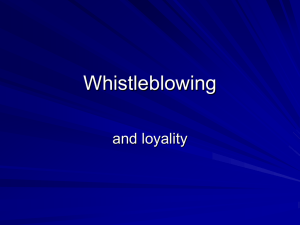

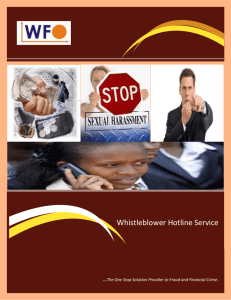
![Irish_Instruments[1]](http://s2.studylib.net/store/data/005225244_1-933d38d948219028b61a355ae6baf1c4-300x300.png)
